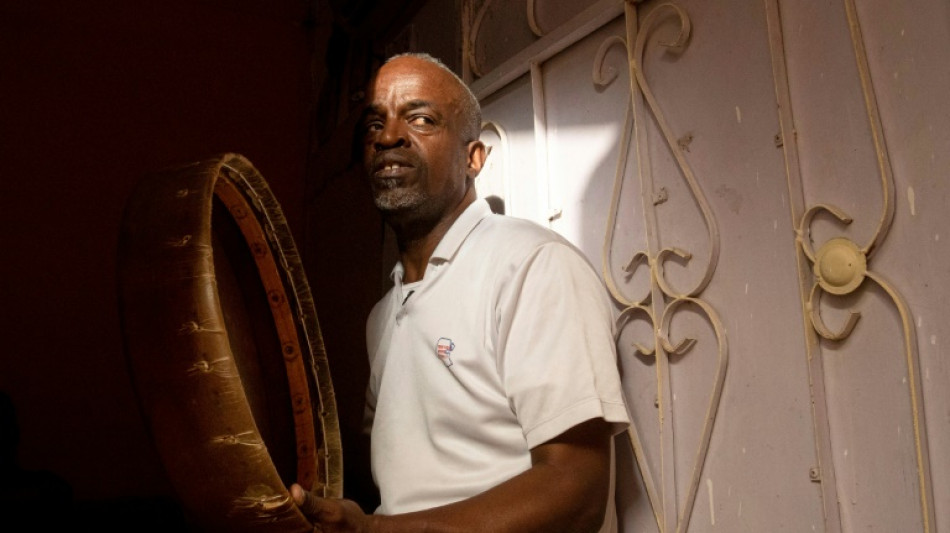
-
 Ruud sails past Medvedev into Madrid Open semis
Ruud sails past Medvedev into Madrid Open semis
-
'Not a commodity': UN staff rally over deep cuts
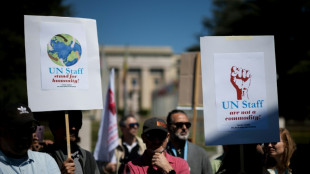
-
 Flintoff proud as Afghan refugee protege plays for Lancashire second team
Flintoff proud as Afghan refugee protege plays for Lancashire second team
-
Peruvian cardinal accused of abuse challenges late pope's sanction
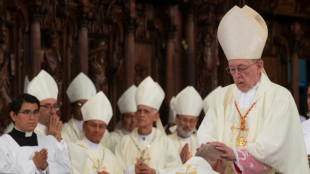
-
 Trans women barred from women's football by English, Scottish FAs
Trans women barred from women's football by English, Scottish FAs
-
Oil prices drop, stocks diverge amid economic growth fears
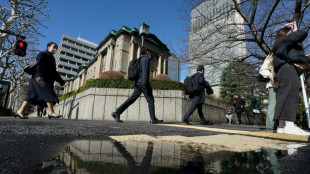
-
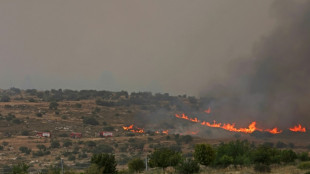 Israel brings fire near Jerusalem 'under control', reopens roads
Israel brings fire near Jerusalem 'under control', reopens roads
-
Lopetegui appointed coach of Qatar

-
 UK counter-terrorism unit probes rappers Kneecap but music stars back band
UK counter-terrorism unit probes rappers Kneecap but music stars back band
-
Yamal heroics preserve Barca Champions League final dream

-
 2026 T20 World Cup 'biggest women's cricket event in England' - ECB
2026 T20 World Cup 'biggest women's cricket event in England' - ECB
-
Bangladesh begins three days of mass political rallies
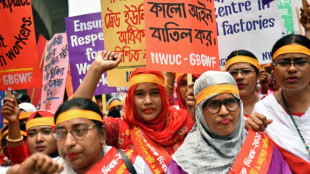
-
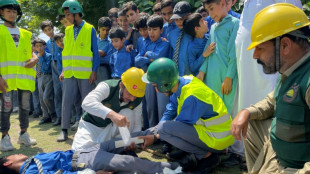 Children learn emergency drills as Kashmir tensions rise
Children learn emergency drills as Kashmir tensions rise
-
Millions of children to suffer from Trump aid cuts
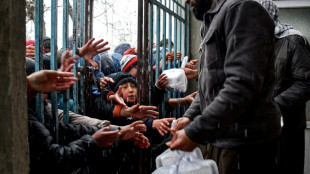
-
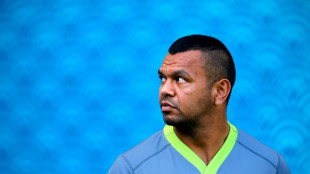 Veteran Wallaby Beale set for long-awaited injury return
Veteran Wallaby Beale set for long-awaited injury return
-
Syria's Druze take up arms to defend their town against Islamists

-
 Tesla sales plunge further in France, down 59% in April
Tesla sales plunge further in France, down 59% in April
-
US calls on India and Pakistan to 'de-escalate'

-
 Israel reopens key roads as firefighters battle blaze
Israel reopens key roads as firefighters battle blaze
-
Europe far-right surge masks divisions

-
 James will mull NBA future after Lakers playoff exit
James will mull NBA future after Lakers playoff exit
-
Ukraine's chief rabbi sings plea to Trump to side with Kyiv

-
 Australian mushroom meal victim 'hunched' in pain, court hears
Australian mushroom meal victim 'hunched' in pain, court hears
-
Lakers dumped out of playoffs by Wolves, Rockets rout Warriors

-
 Booming tourism and climate change threaten Albania's coast
Booming tourism and climate change threaten Albania's coast
-
US reaching out to China for tariff talks: Beijing state media

-
 Tariffs prompt Bank of Japan to lower growth forecasts
Tariffs prompt Bank of Japan to lower growth forecasts
-
Kiss faces little time to set Wallabies on path to home World Cup glory

-
 Serbian students, unions join forces for anti-corruption protest
Serbian students, unions join forces for anti-corruption protest
-
Slow and easily beaten -- Messi's Miami project risks global embarrassment

-
 Fan in hospital after falling to field at Pirates game
Fan in hospital after falling to field at Pirates game
-
Nuclear power sparks Australian election battle

-
 Tokyo stocks rise as BoJ holds rates steady
Tokyo stocks rise as BoJ holds rates steady
-
Bank of Japan holds rates, lowers growth forecasts

-
 'Sleeping giants' Bordeaux-Begles awaken before Champions Cup semis
'Sleeping giants' Bordeaux-Begles awaken before Champions Cup semis
-
Napoli eye Scudetto as Inter hope for post-Barca bounce-back

-
 Germany's 'absolutely insane' second tier rivalling Europe's best
Germany's 'absolutely insane' second tier rivalling Europe's best
-
PSG minds on Arsenal return as French clubs scrap for Champions League places

-
 UK WWII veteran remembers joy of war's end, 80 years on
UK WWII veteran remembers joy of war's end, 80 years on
-
Myanmar junta lets post-quake truce expire

-
 Rockets romp past Warriors to extend NBA playoff series
Rockets romp past Warriors to extend NBA playoff series
-
Messi, Inter Miami CONCACAF Cup dream over as Vancouver advance

-
 UN body warns over Trump's deep-sea mining order
UN body warns over Trump's deep-sea mining order
-
UK local elections test big two parties

-
 US judge says Apple defied order in App Store case
US judge says Apple defied order in App Store case
-
Seventeen years later, Brood XIV cicadas emerge in US

-
 Scorching 1,500m return for Olympic great Ledecky in Florida
Scorching 1,500m return for Olympic great Ledecky in Florida
-
Israel's Netanyahu warns wildfires could reach Jerusalem

-
 Istanbul lockdown aims to prevent May Day marches
Istanbul lockdown aims to prevent May Day marches
-
Former U.S. Attorney and Assistant U.S. Attorney Join National Plaintiff Law Firm Singleton Schreiber as Spokane Partners


In Iraq, centuries-old black community still on the margins
Adnan Abdelrahman shows off the drums he learned to play at age 12. He belongs to Iraq's centuries-old black minority, guardians of musical traditions but relegated to the margins of society.
Centred in the city of Zubair, near Basra in the far south of Iraq, the community has its origins in East Africa.
Like other remote parts of Iraq, Zubair is a place of poverty and decaying public services, where dusty roads are lined with simple cement houses.
While activists denounce the community's marginalisation, talk of racism or discrimination offends Zubair's inhabitants, who prefer the euphemism "dark skin" in Arabic to the word "black".
Abdelrahman, 56, is a member of one of the popular music troupes that have made Zubair famous throughout the country and in Kuwait, only 30 kilometres (20 miles) away.
"It's a profession you inherit," he said, explaining that his uncle sang and his father played the drum. "If someone dies, his son takes his place so that the art doesn't disappear."
Equipped with darboukas, tambourines and large goat skin drums, musicians liven up weddings by leading the "zaffa", a procession of song and dance to celebrate the bride and groom.
Abdelrahman, who has played for four years in a heritage group sponsored by the culture ministry, said the majority of players are black and added that he does not feel discrimination.
"Racism is something we have never seen," he said.
- History of slavery -
But many activists within the black community disagree, among them 32-year-old Majed al-Khalidy.
"Those with dark skin are fifth-class citizens, not even second-class," said Khalidy, who works for an oil company in Basra.
"Since the establishment of the Iraqi state, we have not seen anyone from the community occupy a senior position in the state. We have not seen a governor, a minister or a lawmaker."
He said the community faces a high drop-out rate from school, poor job opportunities and offensive language, even from religious clerics, with many people still using the Arabic term "slave" to designate a black person.
The minority numbers 250,000 to two million people, according to a wide range of informal estimates. Their ancestors came from Kenya, Ethiopia and Sudan, said historian Ibrahim al-Marashi of California State University.
They are centred in Iraq's southern Basra region, where black slaves were brought from East Africa "for the backbreaking work of draining the salt marshes" east of the city, said Marashi.
"In the historical record, the first mention of the community is in 869 CE when they revolted" against the Abbasid Caliphate, he said.
Today "black Iraqis continue to face systematic discrimination and marginalisation", according to the Minority Rights Group International.
The London-based MRG says in an online report that Iraq's black community suffers disproportionately high illiteracy and unemployment rates and that "many cannot find employment other than as labourers or domestic workers".
- 'Below poverty line' -
In a recent sign of progress, a state-run TV news channel hired a young black woman, Randa Abdel Aziz, as a presenter -- but such steps remain rare.
More change is needed, said Khalidy, the activist.
In a multi-faith, multi-ethnic country, he demanded the inclusion of his community in the quota system which reserves parliament seats for certain minorities, including Christians and Yazidis.
"To claim your rights, you have to be close to the decision-makers," he said about a political system where lawmakers can open the doors to all kinds of state largesse, especially public sector jobs.
Saad Salloum, an expert on religious and ethnic diversity, agreed that "discrimination is seen at all levels" against black Iraqis.
"Politically, they have no representation. Socially, certain stereotypes remain rooted in the dominant culture. Economically, the majority live below the poverty line."
The group MRG recalled that after the fall of former dictator Saddam Hussein, "black Iraqis began to organise and develop a political consciousness for the first time".
The Free Iraqi Movement, the first group to defend the rights of black Iraqis, was founded in 2007 and encouraged by the election in the United States of Barack Obama as president.
Several members of the movement ran for the 2010 provincial elections in Basra, though none were elected, MRG recounted. In 2013, its founder, Jalal Thiyab, was murdered in the city.
"There is still a long way to go to achieve equality for this and all other minorities," said Salloum.
M.Fischer--AMWN